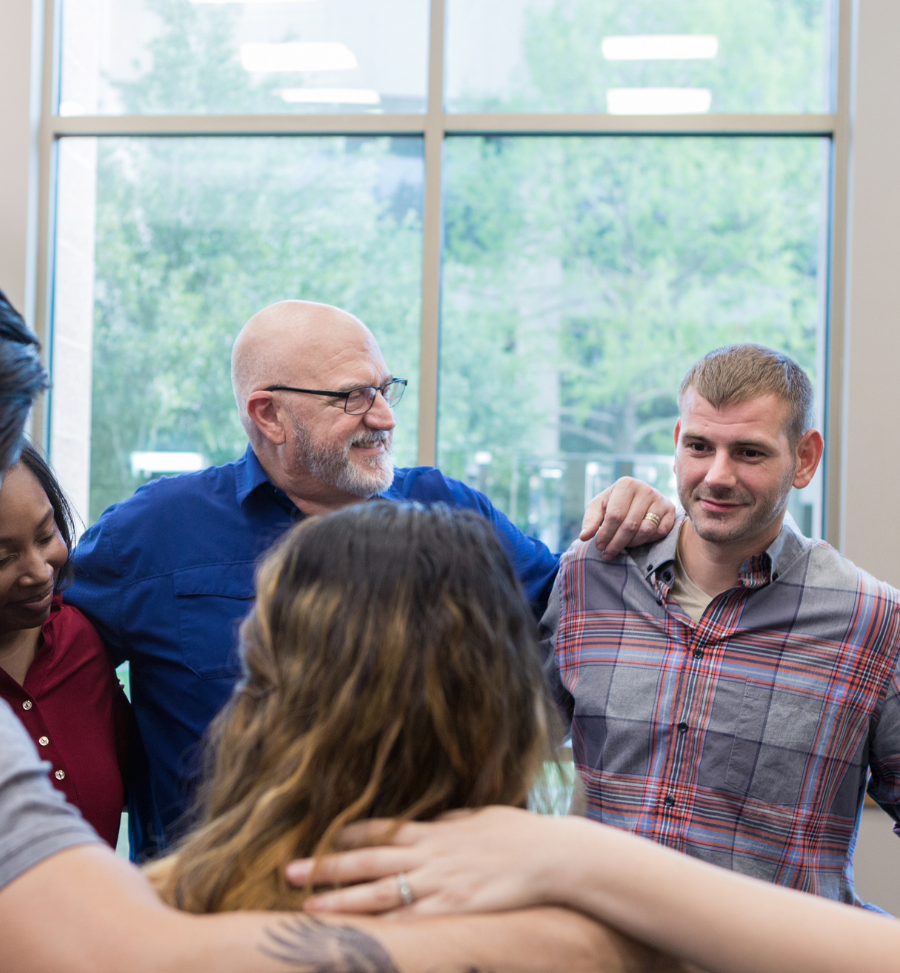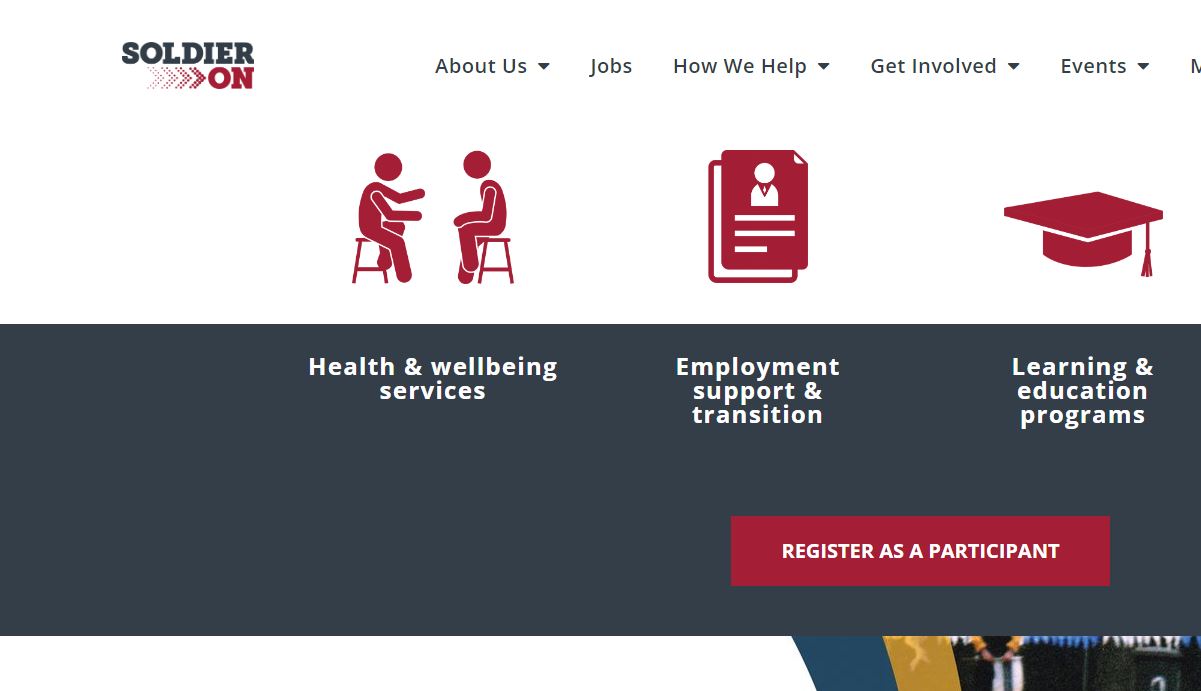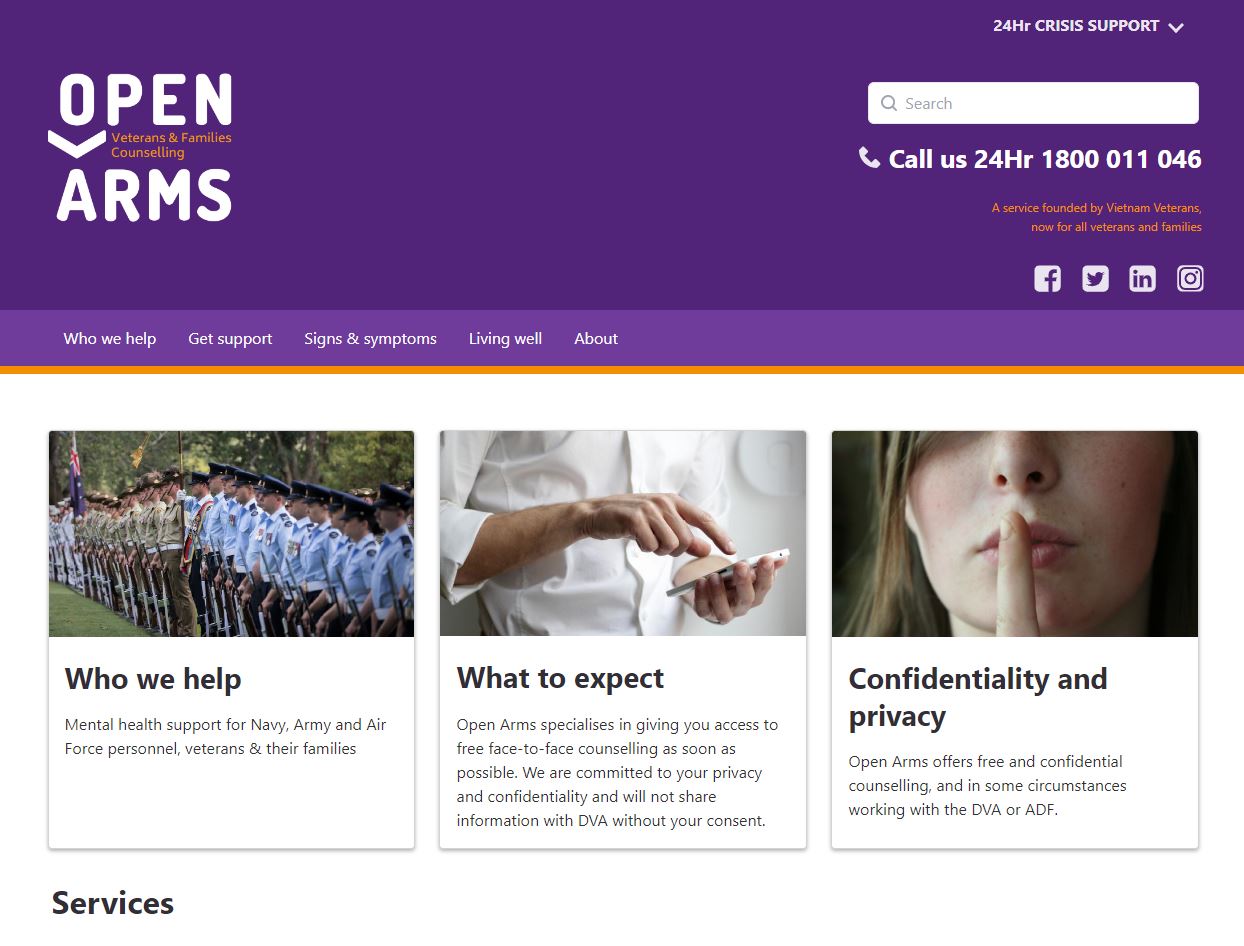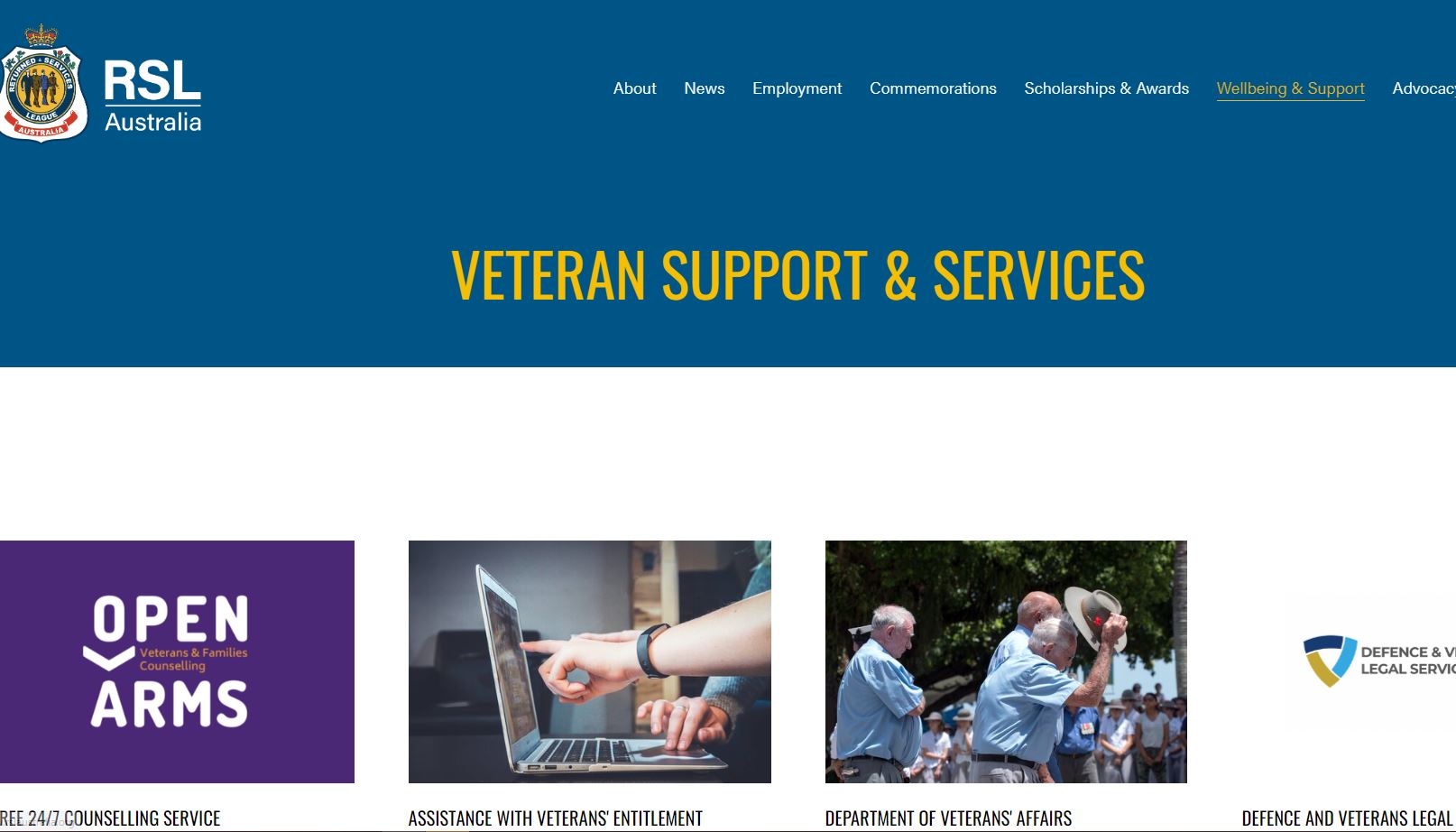Overview
Being away from home and exposure to stressful and dangerous situations can have a negative impact on your mental health and well-being. Returning home or leaving the defence force can be just as difficult time for some.
In 2021 the Australian Bureau of Statistics reported that there were “more than half a million Australians who had served. or were serving, in the Australian Defence Force” and around “one in five reported they had one or more long-term health conditions” with mental health being the most common condition reported.
Some of the mental health conditions you may face during or post-service include:
- anxiety
- depression
- post-traumatic stress disorder (PTSD)
Unfortunately, due to negative attitudes and stigma some people do not talk about their mental health experiences. However, your mental health should be treated as equally important as your physical health.
Supporting yourself
There are a number of resources and services that can help you on your journey to improving your metal health and well-being. Whilst professional support may be a crucial element for some, there are other areas of your life that you make changes to that will support your overall health and well-being.
Eating well
Good nutrition plays an important role in supporting your mental, physical and emotional health as well as in the prevention and treatment of physical and mental health conditions. If you aren’t quite sure what foods are best for your body and lifestyle speaking to a nutritionist or dietician can be helpful.
Maintaining physical exercise
Physical activity is important at all stages of your life however it can be difficult to get in the habit of regular exercise when you aren’t feeling your best. Physiologist treatments (aka Physio Therapy) and Exercise Physiology can be helpful if you are dealing with chronic pain or injury.
If you are finding it difficult to get into a routine services such as Veteran Benefits Australia offer exercise programs to help support you to get back on track.
Sleep
Sleep is an important component for staying mentally well however insomnia and poor sleep are not uncommon in veterans and active defence force members.
There are a few things you can do to support yourself in getting a good nights sleep:
- Limit or remove caffeine and alcohol intake before bed.
- Avoid using screens and electronic devices at least 60 -90 minutes before bed.
- Try and create a relaxing sleep space.
- Keep a sleep diary. This will help you track your sleep patterns and can be helpful if you choose to discuss sleep with a health professional.
If poor sleep is impacting your day to day life and you are experiencing ongoing nightmares, poor quality of sleep or insomnia it can be helpful to seek support from a health professional. Your health professional may offer other treatment options for you such as Cognitive Behavioural Therapy or medications for insomnia.
Drinking responsibly
You may consume alcohol for a number of reasons, socialising with friends and family or to deal with difficult emotions or chronic pain for example. Although ‘having a few cold ones’ at the end of the day may be the social norm for many, excessive alcohol consumption is a concern and poses major health risks. Drinking to numb your feelings or pain is also something that needs to be addressed.
With that said you don’t have to consume large amounts of alcohol often for drinking to become a problem. Whether you engage in excessive drinking on a regular basis or on the odd occasion alcohol use and intoxication increases the likely hood of other issues such as drink driving, relationship problems, alcohol related violence and injuries, heightened pain sensitivity, physical and mental health concerns and alcohol dependency.
If you are concerns about your alcohol consumption the Australian Department of Defence recommends the Alcohol Use Disorders Identification Test (AUDIT) as “the most widely used screen for alcohol use in Australia.”
Making time for relationships
It is important to make time for others, remain social and continue to build on your relationships with your partner, family, friends or peers. Returning home may be an adjustment for you. Remember your family and friends are your biggest supporters, be honest with them and let them know if you need time and space.
Staying active in your community
Transitioning from service is a time of great change that can be challenging and requires planning. For some continuing to serve the community is an important priority.
Services such as Serving On support career transition as well as offering a national volunteering program providing skills, opportunities and support to veterans.
Supporting another person
If you are a family member caring for a veteran or someone who is currently serving you may have questions about how you can best support them.
This can be a difficult time for everyone, you may notice changes in your loved one or have concerns about their behaviour. It is important that you talk to them and seek external support if your concerns continue.
Some things to look out for include the person:
- isolating themselves
- showing a lack of interest in activities or life
- engaging in incidences of anger or violence
- showing difficulty adjusting when they return home
- experiencing anxiety
- increasing their alcohol or drug use
- is unable to sleep
If you feel concerned for your loved one, frustrated by or unable to understand the changes you are seeing in them there are services available that provide support and information to defence partners and families across Australia:
- Open Arms
- Australian Department of Defence
- The Partners of Veterans Association of Australia Inc
- Defence Families of Australia / Defence Member and Family Helpline 1800 624 608
How we can help
If you or someone you know is in crisis
If you are worried you may harm yourself or someone else, or need immediate help for someone else in this situation:
Please call 000If you are in distress
Other helplines
- Beyond Blue | 1300 22 4636
- Open Arms – Veterans & Families Counseling | 1800 011 046
- MensLine Australia | 1300 78 99 78
- Defence All Hours Support Line | 1800 628 036
- QLife | 1800 184 527
- 13YARN| 13 92 76
Please select a state you live in
Suicide Call Back Service. Free professional telephone counselling & online chat available at suicidecallbackservice.org.au
Available 24/7
1800RESPECT Domestic Violence Counselling & Support Line. Online Chat at 1800respect.org.au or SMS on 0458 737 732
Available 24/7
13YARN First Nations Peoples Crisis Support Line. Call to talk with an Aboriginal or Torres Strait Islander Crisis Supporter
Available 24/7
Defence All Hours Telephone Support Line. For Australian Defence Force (ADF) members and their families
Available 24/7
Health Direct. Speak to a registered nurse for healthcare advice. healthdirect.gov.au
Available 24/7
Beyond Blue. Online counselling, forums, and webchat - beyondblue.org.au
Available 24/7
Access Mental Health Line. For people who have concerns about their own, or someone else’s mental health
Available 24/7
Medicare Mental Health Centre Canberra. Phone, request a call canberrammhc.com.au.
Monday, Wednesday & Friday: 8.30am-5:00pm. Tuesday & Thursday (extended hours): 8:30am-7:00pm
NSW Hospital and Health Services State-wide Mental Health Line. Speak to a trained Mental Health Professional
Available 24/7
Medicare Mental Health. Phone to find your nearest centre. Support through Medicare Mental Health Centres are free. No appointment or GP referral is required. Visit www.medicarementalhealth.gov.au
Hours vary.
NT Mental Health Line. For people who have concerns about their own, or someone else’s mental health. Speak to a trained mental health professional.
Available 24/7
Darwin Medicare Mental Health. Clinical Assessment and Treatment. Call, walk-in (16 Scaturchio St, Casuarina.)
Mon - Wed and Fri: 9am - 9pm; Thur: 1pm - 9pm; Sat - Sun (and public holidays): 12pm - 8pm
13 HEALTH. A confidential phone service that provides health advice. Call to talk to a registered nurse.
Available 24/7
1300 MH Call. A confidential mental health telephone triage service providing information, advice and referral.
Available 24/7
Medicare Mental Health. Phone to find your nearest centre. Support through Medicare Mental Health Centres are free. No appointment or GP referral is required. Visit www.medicarementalhealth.gov.au
Hours vary.
SA Mental Health Triage. A confidential mental health telephone service, staffed by mental health clinicians, providing information, advice and referral.
Available 24/7
Urgent Mental Health Care Centre (UMHCC) located at 215 Grenfell Street, Adelaide, offers an alternative to presenting at hospital Emergency Departments for a mental health crisis.
Available 24/7
Medicare Mental Health. Phone to find your nearest centre. Support through Medicare Mental Health Centres are free. No appointment or GP referral is required. Visit www.medicarementalhealth.gov.au
Hours vary.
LETSS Lived Experience Telephone Support Service (Adelaide Metro). letss.org.au
5pm - 11:30pm, 365 days a year
Access Mental Health- Helpline Triage offering phone counselling, information and referral.
9am - 10pm
Medicare Mental Health. Phone to find your nearest centre. Support through Medicare Mental Health Centres are free. No appointment or GP referral is required. Visit www.medicarementalhealth.gov.au
Hours vary.
Victoria Psychiatric Triage providing an initial assessment and identifies whether a person needs further assessment or referral.
Available 24/7
Geelong Head to Health. Call or walk-in at 8 Station Street, Norlane.
Monday–Friday, 12pm–9pm and Saturday–Sunday/public holidays, 1pm – 6pm
Medicare Mental Health. Phone to find your nearest centre. Support through Medicare Mental Health Centres are free. No appointment or GP referral is required. Visit www.medicarementalhealth.gov.au
Hours vary.
Rurallink - An after-hours telephone service for people in rural and regional WA experiencing a mental health crisis
Weeknights 4:30pm-8:30am / 24hrs on Weekends and Public Holidays
Peel -Mental Health Emergency Response Line. Call to speak with a trained mental health clinician. Callers referred to acute response teams.
Available 24/7
TTY - Mental Health Emergency Response Line.Call to speak with a trained mental health clinician. Callers referred to acute response teams.
Available 24/7
Metro - Mental Health Emergency Response Line. Call to speak with a trained mental health clinician. Callers referred to acute response teams.
Available 24/7
Medicare Mental Health. Phone to find your nearest centre. Support through Medicare Mental Health Centres are free. No appointment or GP referral is required. Visit www.medicarementalhealth.gov.au
Hours vary.
Please select a state you live in
Service Options
**** *****
**** ***** * *********** *********** ***
**** ***** ********* *****
**** ***** * *********** *********** ***
**** ***** ********* *****
**** ***** * *********** *********** ***
**** ***** ********* *****
**** ***** * *********** *********** ***
**** ***** ********* *****
**** ***** * *********** *********** ***
**** ***** ********* *****
**** ***** * *********** *********** ***
**** ***** *****





